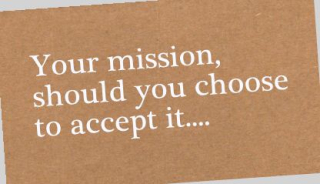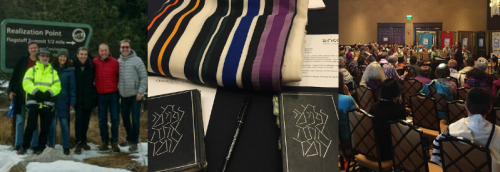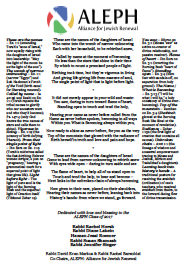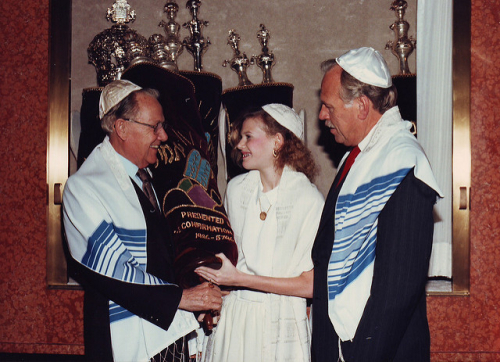Rachel Barenblat's Blog, page 93
January 21, 2017
Mission Accepted - a d'var Torah for parashat Shemot
Did you ever watch "Mission Impossible"? At the start of each episode, a recorded voice would announce "Your mission, should you choose to accept it..." And then after explaining the mission, the voice would conclude "this tape will self-destruct in five seconds."
This week's Torah portion contains a scene like that, only without the self-destructing cassette tape. At the burning bush, God tells Moshe his mission: to go to Pharaoh and demand that Pharaoh let God's people go.
Moses demurs, I don't even know who to say has sent me! And God answers "Ehyeh Asher Ehyeh -- I Am Becoming Who I Am Becoming. Tell them that Becoming Itself has sent you." Moses demurs again, and God gives him some magic tricks to perform, a staff that will turn into a snake and back again. Moses demurs a third time:
וַיֹּ֖אמֶר בִּ֣י אֲדֹנָ֑י שְֽׁלַֽח־נָ֖א בְּיַד־תִּשְׁלָֽח׃ / But he said, “Please, My Lord, make someone else Your agent!”
At this point, God does not say "well, it's your mission if and only if you choose to accept it." God says, "fine: your brother will partner with you in this work -- now get to it." God gives Moshe companionship in the task ahead, but God does not give him the chance to say no.
Moshe was out tending sheep in the wilderness, not searching for a new mission in life. And then his eyes were opened to wonder, the bush that burned but was not consumed. And then he heard the voice of God telling him there was work in the world that only he could do. It's no wonder he balked. Who can blame him?
I have empathy for Moshe's "please, God, send someone else." He knew his own failings. He knew all the reasons why he didn't feel suitable for divine deployment. Maybe he liked his life the way it was, and he didn't want to get drawn into politics and into creating change.
Maybe he anticipated that the work of bringing change would be hard and that people would hate him. Sure enough, when he first goes to Pharaoh, the initial effect is that the people's labors are intensified, and the people curse him thoroughly. Leadership is rarely easy. Poor Moshe is disliked both by Pharaoh, and by the people he seeks to serve and to save.
"Please, God, send someone else!" Maybe you too have felt that way. Maybe you've looked at the road ahead and seen that it looks scary. Maybe you know your life needs to change, but you're scared of change and of the work it requires. Maybe you know our nation needs to change, but you're paralyzed by the enormity of the change we need.
Maybe you've been a parent bringing a newborn home from the hospital thinking "I am in way over my head," or started a new job thinking "why did they hire me, I don't have these skills," or stepped reluctantly into leadership wishing someone else had been willing to take the banner because you don't want the drama or the responsibility or the projections others will place on you.
Moshe didn't get to say no to his deployment, but he did get someone to share it with him. I'd like to think that we can all find that, if we keep our eyes open. All of us can seek a colleague, a friend, a brother, a partner -- someone who shares the calling and the burdens that come with it.
Moshe had that in his brother Aharon. Their skillsets were complementary: Moshe spoke to God, and Aharon had the necessary skills to speak to the people. We can take turns being Aharon and Moshe for each other. We can by turns engage with the life of the polis and the life of spirit. We can create change on the front lines, and we can create change behind the scenes. And together we can be stronger, and more, and more whole, than any of us could be alone.
We get to do the work together. We don't get to turn away from the work at hand.
All of us are tasked with perfecting our broken world -- which sometimes means healing the brokenness in ourselves, and sometimes means healing the brokenness in public life. All of us are tasked with speaking truth to power, fighting for freedom, helping the vulnerable push through the narrow place of constriction into liberation. All of us are charged with cultivating the sense of wonder that will let us hear God's voice issuing forth from the fire, and the sense of obligation that binds us to the work we're here to do.
Our challenge is shifting from channeling our inner Moshe -- "Please, God, pick somebody else!" -- to channeling our inner Isaiah (6:8):
וָאֶשְׁמַע אֶת-קוֹל אֲדֹנָי, אֹמֵר, אֶת-מִי אֶשְׁלַח, וּמִי יֵלֶךְ-לָנוּ; וָאֹמַר, הִנְנִי שְׁלָחֵנִי. / And I heard the voice of God saying "whom shall I send, and who will go forth for us?" and I said, "Here I am. Send me."
The work is vast. Working toward redemption -- whether personal or national -- is not easy. But it's what we're here to do. When the work of change and transformation call, don't look around to see who else might pick up the slack. Say "Here I am. Send me."
Cross-posted to my From the Rabbi blog.

January 18, 2017
Returning home from a week in ALEPH-land
Every year I struggle to figure out how to describe my week with this particular subset of my ALEPH / Jewish Renewal community, and every year my words come up short.
This is even more true than it used to be now that with Rabbi David I am co-chair of ALEPH. This means both that our time here in Colorado is longer than it used to be -- we gathered for a Board meeting last week, before the Shabbaton, which came before the smicha (ordination), which came before the OHALAH conference of Jewish Renewal clergy -- and also that our time here in Colorado is more densely-packed with commitments, conversations, and appointments than it ever was before.
Looking back on the last week, my first thought is that I can hardly believe it's only been eight days. Surely I have been away from home for a month! It feels this way to me in part because each day is so packed (morning prayer, meetings, lunch meetings, more meetings, then afternoon prayer, then more meetings, then still more meetings, then evening prayer, then yet more meetings -- not to mention the impromptu meetings in the lobby, the elevator, by the fireplace, in the meal line...)
There's also a way in which gathering with the same community year after year causes time to telescope -- it shrinks and expands, linking now with then and then and then. Of course every year there are new faces: new students in the ALEPH ordination programs, new members of OHALAH. And every year a few of the faces who used to be with us are absent. Even so, the gathering of this community creates a kind of psycho-spiritual container that is palpably the same container each year.
And time takes on a strange quality inside that container. Is it 2017, or is it 2011, or is it 2006? On the Sunday of this trip I found myself thinking: is this the day I was welcomed in to the community (I remember exactly how I felt as I stood in line to walk beneath that chuppah as a baby rabbinical student), or the day I was blessed on my way out of the community, or the day when I got to be a part of the transmission of smicha? And of course it was none of those -- but it was also all of those, all at once.
The last eight days have been dense and rich and full. They've contained countless conversations about the pace of change, and organizational transitions, and the future of ALEPH and Jewish Renewal. They've contained Board meetings and conference sessions, and learning with this year's keynote speaker Rabbi Benay Lappe. We've shared with the OHALAH community some of what we learned over our fifteen-month listening tour (we're working now on the report from those travels; stay tuned.)
One afternoon I went to the hot tub, surrounded by snow, and wound up talking there with colleagues about real-life ethical and halakhic questions we have faced around weddings, Shabbat, and brit milah. We talked about balancing competing values, about integral halakha, about gender and ritual, about ethics and how we make choices. It was an extraordinary conversation, and afterward we cleansed our palate by singing one of Reb Zalman's niggunim and one of Hazzan Jessi Roemer's melodies.
One night I went to a friend's room and held the space and bore witness as some of her dearest beloveds tied tzitzit and tchelet (blue threads) on the tallit she would wear during her rabbinic ordination. Another night I gathered some of my beloveds in my room and together we tied tzitzit and tchelet on my newest tallit, a creation made just for me by my dear friend Rabbi Shulamit Thiede of Not My Brother's Kippah. On still other nights I sat in the lobby with friends and sang songs until far too late, with joy.
I've been privileged this week to bear witness to the smicha (ordination) of a class of mashpi'im (spiritual directors) -- and also the smicha of a new cohort of clergy, a hazzan and four rabbis. I've been privileged this week to take part in some extraordinary davenen, learning new melodies and savoring familiar ones, singing meaningful words in harmony with beloved hevre who care as much as I do about the words and their meanings and how they can connect us up and in and through.
As a special treat, twice over the last week (once before the Board meeting began, and once on Shabbes afternoon) I made it into the mountains with friends to walk and to soak in the natural beauty. That was a gift too. It's all too easy to come here and never leave the confines of the conference hotel, and while I am primarily here for the community and the hevreschaft, sometimes it is sweet to experience those collegial friendships in the setting of the natural world instead of the hotel halls.
This week I've had countless conversations. I've davened, I've learned, I've taught, I've kvelled. And now I am on my way home, physically exhausted but spiritually uplifted, grateful for this community and for the spiritual gifts they have enabled me to receive.

January 15, 2017
Prayer for the Musmachot
These are the names of the daughters of Israel
Who came into the womb of narrow unknowing
Each with her household, to be rebirthed anew,
Called by name at the moment of becoming
No less than the stars that shine in their time
By which to count a promised people of light.
Birthing took time, but they’re vigorous in living
And giving life-giving life from essence of soul,
The single point of light that is light before light.
•
It did not merely appear in your wild and waste:
You saw, daring to turn toward flame of heart,
Standing open to touch and tend the holy,
Hearing your name as never before called from the
Name as never before spoken, becoming in all ways
Within you What is Becoming always within you,
Now ready to shine as never before, for you as the very
Top of the mountain that glowed with the radiance of
Birth herself in truth and love and pain and hope.
•
These are the names of the daughters of Israel
Come to lead from narrow unknowing to rebirth anew
With eyes wide open – daring to turn aside and see
The flame of heart, to help all of us stand open to
Touch and tend the holy, to hear and become –
Next links in the unbroken chain of always becoming
Now given to their care, placed on their shoulders,
Hearing their names as never before, leaning back into
History’s hands: from where we stand, go forward.
Dedicated with love and blessing to the
ALEPH Class of 2017
Rabbi Rachel Hersh
Rabbi Diane Lakein
Hazzan Jessi Roemer
Rabbi Susan Shamash
Rabbi Jennifer Singer
Rabbi David Evan Markus & Rabbi Rachel Barenblat
Co-Chairs, ALEPH: Alliance for Jewish Renewal
CLICK TO VIEW COMPLETE POEM WITH COMMENTARY

January 10, 2017
Off to Colorado once again
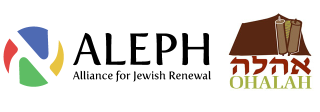
Eleven years ago at this season I made my way to Colorado for my first ALEPH Ordination Programs student Shabbaton and OHALAH conference. I experienced the ritual that welcomes incoming students and blesses outgoing students, on the Sunday morning of the day of the smicha (ordination). After the Shabbaton, I attended my first conference of Jewish Renewal clergy.
I've been back every year since, even the year when I'd just been hospitalized for strokes. The only January gathering I missed was the one when my son was a newborn. (Coincidentally, that was also the only year the conference moved away from Colorado -- that year OHALAH experimented with holding the gathering in St. Louis instead.)
Six years ago this winter I myself was ordained on the day between the ALEPH student Shabbaton and the OHALAH conference. And two years ago I was privileged to participate in the ordination as part of the chain of transmission through which Reb Zalman z"l's legacy flows. Those two experiences of blessing and transformation are highlights of my life.
These days I always go to Colorado a few days before the Shabbaton and conference, because that's when the ALEPH Board of Directors has our annual winter meeting. This year we'll spend that meeting entering into capacity-building and strategic planning with the Reverend Bill Kondrath, with whom I had the pleasure of learning last summer at Clergy Camp. I'm excited about working with him toward a vibrant future for ALEPH and for the renewal of Judaism.
Last year was my first OHALAH conference as co-chair (with R' David) of ALEPH. We discovered that the conference is a somewhat different experience from this vantage. I'm expecting that this year will be similarly booked chock-full of meetings (both scheduled and impromptu), though I'm hoping to make it to at least a few conference sessions, and to get time to connect with a few friends.
If you'll be at the ALEPH Board meeting in Broomfield, or at the Shabbaton that follows it, or at the OHALAH conference of Jewish Renewal clergy, I look forward to learning and dining and davening and harmonizing and simply being with you in the coming days! And if not, I look forward to connecting with you once I return home from my week away. Thanks for bearing with me while I'm on the road.

January 9, 2017
New in The Wisdom Daily: Everything Breaks. It's What We Do With The Pieces That Matters.
...On my scraps of paper, I jotted down phrases like “the sorrow of my divorce” and “tendency to diminish my own needs” and “feeling silenced.” I felt both humbled and hopeful: humbled by the recognition that there’s much I need to shed, and hopeful at the prospect of truly letting those things go.
When we were done writing, we went around the table and took turns reading each scrap of paper aloud and then holding it in the fire until it began to burn. We dropped the flaming bits of paper into the dish that held the tealight. We burned old griefs and bad habits.
When we were done, one of my friends suggested a variation. We each wrote blessings for each of the others, read those aloud, and lit them on fire too — not because we wanted the blessings to burn up, but because the act of setting them aflame felt like a way of offering the intentions up to God.
As we finished reading and burning our hopes and blessings for each other, we heard a loud crack. We promptly blew out the flame, but it was too late — the ceramic dish holding the tealight had broken in two....
That's from my latest essay for The Wisdom Daily.
Read the whole thing: Everything Breaks. It's What We Do With The Pieces That Matters.

January 7, 2017
Free to be - a d'var Torah for parashat Vayigash
וְלֹֽא־יָכֹ֨ל יוֹסֵ֜ף לְהִתְאַפֵּ֗ק לְכֹ֤ל הַנִּצָּבִים֙ עָלָ֔יו וַיִּקְרָ֕א הוֹצִ֥יאוּ כָל־אִ֖ישׁ מֵעָלָ֑י וְלֹא־עָ֤מַד אִישׁ֙ אִתּ֔וֹ בְּהִתְוַדַּ֥ע יוֹסֵ֖ף אֶל־אֶחָֽיו׃
Joseph could no longer control himself before all his attendants, and he cried out, "Have everyone withdraw from me!" So there was no one else about when Joseph made himself known to his brothers.
That's the verse that leaps out at me this year. And within that verse, one word: בְּהִתְוַדַּ֥ע, "he made himself known."
The root of this word is the simple verb meaning to know. To know, to perceive, to distinguish one thing from another. This verb can mean to know someone "in the Biblical sense," to make love with someone and thereby know them deeply. It appears here in the causative form: to cause oneself to be known.
To cause oneself to be known.
How often do we dedicate our energies to ensuring precisely the opposite? We work hard at hiding ourselves. We hide our tender hearts. We hide our fears. We hide our insecurities. Men in particular are taught to do this in our culture: to hide their vulnerability, because it makes them "weak" or "feminine."
Or perhaps we show our insecurities, and hide our confidence and our strength. Women in particular are taught to do this in our culture: to soften, to backpedal, to hide our strength lest we be perceived as uppity or mannish or threatening.
I have been accused of being unfit for leadership because I act "too much like a man," because I speak my mind and draw clear boundaries.
And I have been accused of being unfit for leadership because I am not enough like a man, because I cry easily and I allow myself to be vulnerable.
If we allow these binaristic gender stereotypes to persist, we can't win. And we can't do what Joseph so bravely does in this week's parsha: we can't allow ourselves to truly be known.
The stereotypes are reductive, and they're also flat wrong.
The Jewish mystical tradition depicts God as being ultimately unitary and beyond all human knowledge, and also at the same time available to us through multiple faces or aspects. God has no gender, and yet we understand God as having both masculine and feminine qualities. God is the ultimate source of lovingkindness and compassion, and also the ultimate source of strength and boundaries.
We who are made in the divine image and likeness manifest these qualities too -- all of them, no matter what our gender expression may be. We do ourselves and each other a great disservice when we insist that men are "supposed" to be strong and women are "supposed" to be gentle, that dad is "supposed" to be the disciplinarian and mom is "supposed" to be the source of comfort... and I mean this not only in our family systems but also in our organizations, in our communities, on boards and committees, in social circles.
What we are "supposed" to be is who we most deeply are. All of who we are, in our fullness, with our contradictions and our yearnings, our hopes and our fears.
In order for Joseph to feel safe making himself known to his brothers, he needs to see that they have changed. He needs to see that they have truly made teshuvah, repented from their earlier mistreatment of him so profoundly that when faced with a similar choice they would choose differently than they did when they sold him into slavery. When he sees that they have made teshuvah and have changed, then he sends the courtiers out of the room and reveals who he truly is.
Each of us needs to do our own inner work, our teshuvah work, our work of repentance and repair. We do this work not only for the sake of our own souls, but also because when we do this work, we give the people around us permission to do it, too. When we do this work, we give the people around us permission to make themselves known to us, to reveal the sweetness and the strength, the vulnerability and the courage, of who they most truly are. When we do our own inner work, we make it safe for those around us to be like Joseph: to be real and whole and free to be who we are at last.
Cross-posted to my From the Rabbi blog.

January 3, 2017
Featured on Greylock Glass
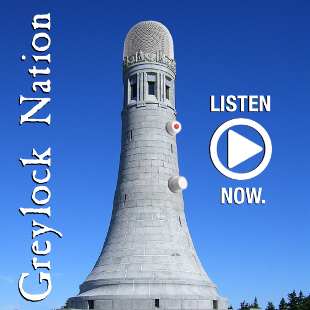 I had the profound pleasure recently of sitting down with Kate Abbott of BTW Berkshires, and with Rabbi David Evan Markus (my dear friend and ALEPH co-chair), for a conversation that was both wide-ranging and deep.
I had the profound pleasure recently of sitting down with Kate Abbott of BTW Berkshires, and with Rabbi David Evan Markus (my dear friend and ALEPH co-chair), for a conversation that was both wide-ranging and deep.
Kate was interviewing us about ALEPH and Jewish Renewal for the Greylock Glass podcast. (Here's her archive at Greylock Glass.)
We spoke for more than an hour: about Judaism, Jewish Renewal, the legacy of Reb Zalman z"l (of blessed memory), the ALEPH / Jewish Renewal Listening Tour, deep ecumenism, and ALEPH's recent resolution that if President-Elect Trump should obligate Muslims to register as such with the government we urge all Jews (and all Americans) to register as Muslims to thwart that nefarious plan. We spoke about the evolution of religious tradition, about the life of the spirit, and about maintaining hope in dark times
This episode of the podcast is about a number of community efforts for solidarity and inclusion. In addition to conversations with us, the podcast includes Nick Cave's exhibit at MASS MoCA, Professor Moustafa Bayoumi coming to speak at Simon's Rock, and four young WordxWord poets reading as part of Othering, the November art show at the Lichtenstein Center for the Arts.
Kate is a terrific journalist, and has a gift for eliciting deep answers to incisive questions. It probably also doesn't hurt that I've known Kate for many years (since the days when journalism was my own career, back when I was editor of The Women's Times, before Inkberry and before rabbinical school), and I've known David even longer. It's easy for conversations among old friends to go to meaningful places.
The podcast episode that arose out of that conversation is now live, and you can listen to it online: Will Call #54: Standing Up Against Othering. (Our segment starts around 47 minutes in, and lasts for about half an hour, but I recommend listening to the whole thing.)

December 31, 2016
On being enough, the "inner accuser," and letting our light shine
רָנִּ֥י וְשִׂמְחִ֖י בַּת־צִיּ֑וֹן כִּ֧י הִנְנִי־בָ֛א וְשָׁכַנְתִּ֥י בְתוֹכֵ֖ךְ נְאֻם־יְה
"Shout for joy, daughter of Zion! For behold, I come, and I will dwell within you, says Adonai."
That's the first line of the special haftarah reading for Shabbat Chanukah, Zechariah 2:14-4:7, which I chanted many years ago at my bat mitzvah.
I've remembered that opening line all these years. But there's much in this haftarah from Zechariah that I didn't remember. For instance, Zechariah's vision of Joshua, the high priest, standing before God as though on trial, with השטן / ha-satan, "the Accuser," there to accuse him. But God rebukes the accuser, says that Joshua is a "firebrand plucked from the fire," and makes his dirty garments white as snow.
Then an angel wakes Zechariah and asks what he sees. Zechariah describes a vision of a golden menorah, mystically fed by a stream of flowing oil direct from two olive trees. Zechariah asks the angel what this means, and the angel tells him, "'Not by might, and not by power, but by My spirit alone' -- so says the God of Hosts."
The vision of the golden menorah may be why these verses are chanted on Shabbat Chanukah. They evoke the miracle: the oil that should not have been enough to keep the eternal flame kindled, but somehow it was enough. Or maybe the miracle is that our forebears took the leap of faith of lighting the eternal flame in the first place.
These verses evoke, too, our sages' decision centuries ago not to include the story of guerilla warfare in our sacred scripture. The Books of Maccabees, which tell the tale of the insurgency against Antiochus, are not part of the Hebrew Bible. When we tell the story of Chanukah, we tell the story of the miracle -- the oil, and the faith -- not the story of insurgents fighting soldiers. "Not by might, and not by power, but by My spirit alone."
What we have, what we are, is enough -- even at times when we fear we don't have enough to offer. Even when all we have are the tiny sparks of hope we nurture and carry in our own hearts. We read in Proverbs that "The candle of God is the soul of a human being." Our souls are God's candles. It's our job to be the light of the world. So far, so good. But what do I make of that perplexing passage earlier in the haftarah, the vision of Joshua and ha-satan, the Accuser?
This year I read those verses as a parable about internal reality. I know what it's like to hear the words of my inner accuser. That voice tells me that my mis-steps disqualify me from being the person I want to be. Who am I to claim to be a servant of the Most High when my garments are so shabby -- when the life I try to weave is so riddled with mistakes, disappointments, inadequacies? That voice reminds me of all the good I intended to do in the world that I failed to do, the loved ones whose suffering I cannot alleviate, the problems I cannot fix.
But the Holy One of Blessing sees me otherwise. God sees me through loving eyes. God sees my good intentions, even when I don't live up to them the way I wish I could. God sees my struggles and my griefs not as a sign that I am failing, but as the refining fire that burns away my illusions. God says to my inner accuser: this soul is a burning branch plucked from the fire of human circumstance, and her yearning to do better and be better is what enables her light to shine. God says to my inner accuser: see, I forgive this soul's mis-steps, and I make the garment of her life as white as snow.
Each of us has that inner accuser... and each of us can experience redemption from that voice when we remember that we are seen also through loving eyes. If you believe in a God Who sees you, then those loving eyes are Divine. If you don't believe in that kind of personalized deity, then those eyes may be those of someone in your life... or they may be your own eyes, when you take the leap of faith of seeing yourself the way you wish your dearest beloved could see you.
In Zechariah's vision, Joshua's garments become white as snow. Just so for all of us. When we do our own inner work to try to be better, our tradition teaches, we are forgiven. And the sorrows of the old year, the stains and smudges on our life's "garment," do not disqualify us from hoping for better in the year to come. On the contrary: it is precisely with awareness of our mistakes and our sorrows that we are called to hope for better -- to kindle the light of hope even when reason would argue otherwise.
Our task is to let our light shine, and to trust in the One Who ensures that what we have, that what we are, is enough to meet whatever comes.
This is the d'var haftarah I offered at my shul earlier today, on New Year's Eve Day which is also Shabbat Chanukah which is also my bat-mitzvah-versary. (Cross-posted to my From the Rabbi blog.)

December 27, 2016
As the year draws toward its close
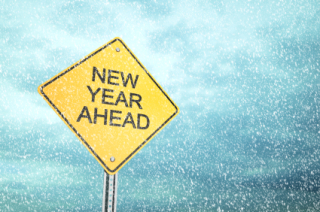 At the end of the Jewish year, there are practices of introspection designed to help us re-align ourselves. The work of teshuvah (repentance / return / returning to our deepest and truest selves) calls us to look seriously at who we've been and who we want to become. The end of the secular year isn't as much a time of inner work for me as the end of the Jewish year, but it's still a natural time to pause and take stock of who I am and where I'm going.
At the end of the Jewish year, there are practices of introspection designed to help us re-align ourselves. The work of teshuvah (repentance / return / returning to our deepest and truest selves) calls us to look seriously at who we've been and who we want to become. The end of the secular year isn't as much a time of inner work for me as the end of the Jewish year, but it's still a natural time to pause and take stock of who I am and where I'm going.
It's a truism to say that no year is quite like any other, but 2016 was particularly unusual for me because it was the year during which my eighteen year marriage came to its end. Midway through 2016 I moved out of the home I'd lived in since 1999, the home in which I had once thought I might live out the rest of my days. And I began to live on my own for the first time. Not "alone" -- thanks to my seven-year-old -- but on my own.
That's a big transition, and it's one I'm still navigating. Those of you who have lived on your own for a long time may take those rhythms for granted. Those of you who have lived with a partner, or with other family members, for a long time may not realize in how many subtle ways one comes to rely on the patterns that evolve between people who share a household and a life. I knew this would be a big change, and it has been as momentous as I expected.
Spiritually speaking, the latter half of this year has been an exercise in drawing on what sustains me. Sometimes that means meditation and prayer, sometimes singing in harmony with friends, sometimes hot tea and solitude. It's also been a time of navigating grief. It's also been an exercise in finding small pleasures to savor: the chickadees discovering the bird feeder I hung outside the kitchen window, or my mastering a new recipe in the slow cooker I bought at a tag sale over the summer.
As I look ahead to 2017, I know that I will need to continue being attentive to what nourishes my heart and spirit. I will need to continue learning how to rely on myself and trust my own strength -- and also to lean on community, family, and friends sometimes, and not to isolate myself from the communities of which I am a part. I'll keep working at making a home for myself and my son, brightened by Shabbat candles and by the presence of friends.
2016 has been a difficult year, but has contained gifts that counterbalance its sorrows (on a personal level, at least; I'm not looking in this moment at the traumas of the globe, which have been substantial.) I'm grateful for the old year's gifts, and I know that the secular new year will contain gifts too. Whatever your 2016 has been, I hope that you can find blessings to uplift as the secular year begins to wind down -- and may we all release the sorrows of the old year, and let them float away.

December 26, 2016
Remembering my grandfather
Receiving Torah from my grandfather Eppie, of blessed memory. ,
I never knew my father's parents. My siblings did, but I didn't. Nana and Papa died before I was born. I inherited my name from my Nana whom I never knew. But I knew my mother's parents well. They were a major part of my childhood.
Almost everyone called them "Lali" and "Eppie." Lali, the name we used for my grandmother, was a Czech term of endearment. Eppie, on the other hand, was an abbreviation of his surname (Epstein). It had become his nickname in medical school, and it stuck.
Eppie was brilliant. I mean that both in terms of his intellect (he spoke seven languages) and in terms of his light. When he was enthusiastic about something, he shone.
He was born in 1908 in New York to Russian parents who decided that they didn't particularly like the goldene medina, so they went back home. He grew up in Stolpce, a town in Belarus near Minsk. He used to tell me that he had such a gift for Hebrew and Judaics that the teachers at his cheder wanted him to become a rabbi, but he wanted to be a doctor. So they sent him to gymnasium, and then he went on to medical school in Prague. The accident of his American birth proved miraculous: it was what enabled him and his Czech wife and their three-year-old daughter, my mother, to flee Prague in 1939.
Once he came to this country he mastered English, became licensed to practice medicine here, and went to work for the VA. My mom and her siblings grew up in a variety of towns across the American south -- places like McKinney and Temple, Texas -- where Eppie was posted at the local VA hospital. I've often wondered what it was like for my refined and cosmopolitan Czech grandmother to rear children in places that must have seemed so strange.
He was a thoracic surgeon, though by the time I remember him clearly he was already on his way to retirement. I remember him as a builder and maker and tinkerer. He made hand-stitched leather albums to hold his stamp collections. He typed letters and postcards to send to me at summer camp. He cooked breakfast when I stayed overnight at their house -- scrambled eggs and kosher salami. He was an engaged grandparent who came to all of my piano recitals and school plays and applauded everything I did.
What aptitude I have for languages I think I inherited from him. (Though I doubt I will master seven over the course of my lifetime.) When I was a kid I used to say I wanted to be a doctor, because I wanted to be just like him. Instead, I wound up taking the career path he didn't take.
He left this life on the second night of Chanukah, twenty years ago. Sometimes I marvel at how much has unfolded in my life since he died. He didn't live to see me married, nor of course to see me divorced. He didn't live to see me go to graduate school for my MFA, or to see me pursue the rabbinate. He didn't live to see me become a mother. (My son's Hebrew name, Yitzchak, is in his memory.) Sometimes it's almost unimaginable that someone who was so formative for me hasn't known me in these last two decades of my adult life.
Sometimes I wonder what he would think if he could see me now. I think he would really like my son -- I think my son inherited some of his intelligence, musicality, and determination. I think he would be proud to see me serving as a rabbi.
The picture at the top of this post makes me wince a little bit, because wow, frizzy hair and braces are not a look I would choose to reprise! But aside from my chagrin at the fact of my own adolescence, the photo is precious to me. That's a staged photo, taken a few days before my celebration of bat mitzvah -- which fell on Shabbat Chanukah, so it's another thing I always remember at this time of year. Today is my grandfather's 20th yahrzeit, and I am remembering him with love.
Related:
500 words of memory, 2004
A touch of silk, 2005

Rachel Barenblat's Blog
- Rachel Barenblat's profile
- 6 followers


